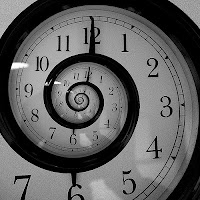So many options. According to Ambrose Bierce, a day is "a period of twenty-four hours, mostly misspent." Surely everyone must wonder how events might have changed. Perhaps even Mother Teresa speculated: what if I had smiled when that boy winked at me, instead of turning away? Take any memory that has stayed with you and ask, what would I change if I could? Open the forbidden door? Listen to the whispered conversation? Ignore the ravenous beast?
And yet. A lifetime of reading science fiction has taught me that we change the past at our peril. We have no idea of the tangential consequences our actions and inactions give rise to. (Just suppose I had had children instead of dogs!) One certainly doesn't want to interfere with the space-time continuum.
I am always the first to preach (and have done so here) that the best course, the only course, is living in the moment, that the past is gone and the future is a distant fiction. Easy enough to say when we're not looking in the mirror or a photo album.
Some years ago, my sister used to amuse herself by asking her twelve-year-old daughter and her friends how much they would sell a year of their youth for. She learned that for under a thousand dollars any one of the girls would have handed over her resilient energy and flexible joints. It is a very good thing -- for those girls at least-- that my sister wasn't a witch. They'd have advanced another year toward the horizon, my sister would be younger than me, and I would be waiting in line at the ATM.
Our bodies and minds betray us, giving rise to such speculation as I've been indulging. I used to think that if I didn't use my body it would stay nice for later. Not so, not so. Words escape me and my joints crackle like static. I adjust the volume in opposite ways than in the past. I still don't know how to ride a bike. And also, I am nearing a haunting convergence: this is the year I will out-live my mother. As Donald Hall writes in "The Day I Was Older":
Whatever my complaints, this old road isn't really so bad or even lonely. Following in her steps, I know some of the things my mother knew but wasn't here to tell me. The company along the way is often convivial and always varied. And lovely time sloshes in a friendly bottle which we pass from mouth to mouth.
…Now I have wakedMore mornings to frost whitening the grassRead the newspaper more times, and stood more times,My hand on the doorknob without opening the door.




